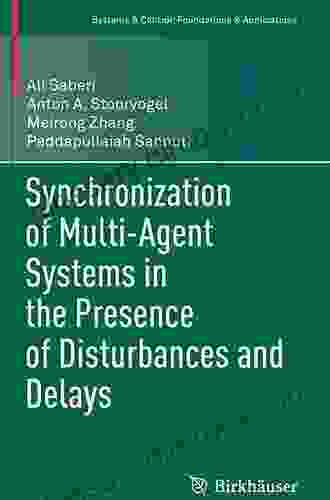Synchronization of Multi-Agent Systems in the Presence of Disturbances: A Comprehensive Guide

4.6 out of 5
| Language | : | English |
| File size | : | 9980 KB |
| Print length | : | 256 pages |
| Screen Reader | : | Supported |
Multi-agent systems (MASs) are composed of multiple autonomous agents that interact with each other and their environment to achieve common goals. Synchronization is a fundamental property of MASs, where the agents' behavior becomes coordinated or aligned over time. This coordination is crucial for many applications, such as swarm robotics, cooperative control, and distributed optimization.
However, achieving synchronization in MASs is challenging due to the presence of disturbances. Disturbances are external factors that can disrupt the agents' behavior and hinder their ability to synchronize. These disturbances can be caused by noise, communication delays, or changes in the environment.
In this article, we will explore the challenges and techniques for achieving synchronization in MASs in the presence of disturbances. We will begin by discussing the different types of disturbances that can affect MASs, and then we will review the latest strategies for mitigating their effects.
Types of Disturbances in MASs
There are many different types of disturbances that can affect MASs. Some of the most common include:
It is important to note that disturbances can have a significant impact on the performance of MASs. They can prevent the agents from achieving synchronization, or they can cause the agents to synchronize in an undesirable way. Therefore, it is essential to develop strategies for mitigating the effects of disturbances in MASs.
Strategies for Mitigating Disturbances in MASs
There are many different strategies that can be used to mitigate the effects of disturbances in MASs. Some of the most common include:
The choice of which strategy to use to mitigate disturbances in MASs depends on the specific application and the nature of the disturbances. However, by carefully selecting and implementing the appropriate strategy, it is possible to achieve synchronization in MASs even in the presence of disturbances.
Challenges in Achieving Synchronization in MASs
While there are many strategies that can be used to mitigate the effects of disturbances in MASs, there are still a number of challenges that need to be overcome in Free Download to achieve synchronization in MASs. Some of the most common challenges include:
Despite these challenges, there has been significant progress in the development of synchronization strategies for MASs in the presence of disturbances. By continuing to address these challenges, it is possible to develop MASs that can operate effectively in a wide range of environments.
Applications of Synchronization in MASs
Synchronization has a wide range of applications in MASs. Some of the most common include:
Synchronization is a fundamental property of MASs that has a wide range of applications. By developing effective strategies for achieving synchronization in MASs, it is possible to enable the development of new and innovative applications for MASs.
Synchronization is a fundamental aspect of multi-agent systems that plays a crucial role in enabling cooperative and coordinated behavior among agents. The presence of disturbances can significantly impact synchronization efforts, introducing challenges that need to be addressed to ensure reliable and effective system operation. This comprehensive guide provides an overview of the challenges and techniques involved in achieving synchronization in multi-agent systems in the presence of disturbances. By leveraging robust control techniques, adaptive control strategies, and distributed consensus protocols, researchers and practitioners can mitigate the effects of disturbances and enhance the synchronization capabilities of multi-agent systems. As research continues to advance in this field, we can anticipate even more innovative and sophisticated solutions for achieving synchronization in the face of real-world complexities.
4.6 out of 5
| Language | : | English |
| File size | : | 9980 KB |
| Print length | : | 256 pages |
| Screen Reader | : | Supported |
Do you want to contribute by writing guest posts on this blog?
Please contact us and send us a resume of previous articles that you have written.
 Book
Book Novel
Novel Page
Page Chapter
Chapter Text
Text Story
Story Genre
Genre Reader
Reader Library
Library Paperback
Paperback E-book
E-book Magazine
Magazine Newspaper
Newspaper Paragraph
Paragraph Sentence
Sentence Bookmark
Bookmark Shelf
Shelf Glossary
Glossary Bibliography
Bibliography Foreword
Foreword Preface
Preface Synopsis
Synopsis Annotation
Annotation Footnote
Footnote Manuscript
Manuscript Scroll
Scroll Codex
Codex Tome
Tome Bestseller
Bestseller Classics
Classics Library card
Library card Narrative
Narrative Biography
Biography Autobiography
Autobiography Memoir
Memoir Reference
Reference Encyclopedia
Encyclopedia Gareth Conner
Gareth Conner Fiona Easterby
Fiona Easterby Frank Stewart
Frank Stewart Francis J D Hyland
Francis J D Hyland Faith Eidse
Faith Eidse G Venkataraman
G Venkataraman Rosalind J Lee
Rosalind J Lee Michelle Mullen
Michelle Mullen Francesca Catlow
Francesca Catlow Tsuyoshi Miyazaki
Tsuyoshi Miyazaki Jeannine Atkins
Jeannine Atkins Malcolm Cook
Malcolm Cook Farah Naz Rishi
Farah Naz Rishi Kent Nguyen
Kent Nguyen Fritz Damler
Fritz Damler George Catlin
George Catlin G Bailey
G Bailey Garth Nix
Garth Nix Garry Antonio
Garry Antonio Favour B Wilson
Favour B Wilson
Light bulbAdvertise smarter! Our strategic ad space ensures maximum exposure. Reserve your spot today!

 Damon HayesAnticipating Type Tango Endings: A Literary Odyssey Unraveling the Secrets of...
Damon HayesAnticipating Type Tango Endings: A Literary Odyssey Unraveling the Secrets of...
 Charlie ScottBonnets and Bugles: A Timeless Tale of Love and Resilience Amidst the Civil...
Charlie ScottBonnets and Bugles: A Timeless Tale of Love and Resilience Amidst the Civil... Carlos FuentesFollow ·3.7k
Carlos FuentesFollow ·3.7k Paul ReedFollow ·2.6k
Paul ReedFollow ·2.6k Rick NelsonFollow ·7.4k
Rick NelsonFollow ·7.4k Chinua AchebeFollow ·18.9k
Chinua AchebeFollow ·18.9k Caleb LongFollow ·9.3k
Caleb LongFollow ·9.3k Dwight BellFollow ·17.1k
Dwight BellFollow ·17.1k Harold PowellFollow ·10.5k
Harold PowellFollow ·10.5k Ben HayesFollow ·7.1k
Ben HayesFollow ·7.1k

 Braden Ward
Braden WardYounger Ten: Writing the Ten-Minute Play
Unlock the Secrets of...

 Jon Reed
Jon ReedAffiliate Marketing Super Affiliate Marketing: The...
Are you ready to unlock the...

 Yukio Mishima
Yukio MishimaMaster the Fundamentals of Quality Improvement with "The...
Unlock Your...

 Nathan Reed
Nathan ReedCamping Around Victoria High Country: Explore Australia's...
Prepare to be captivated by the...
4.6 out of 5
| Language | : | English |
| File size | : | 9980 KB |
| Print length | : | 256 pages |
| Screen Reader | : | Supported |












